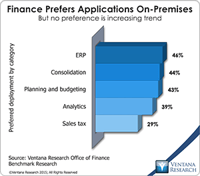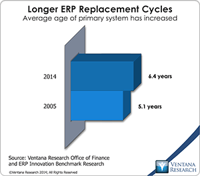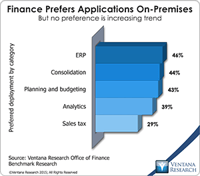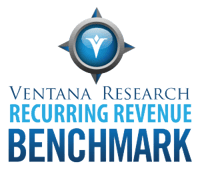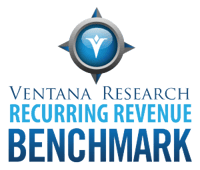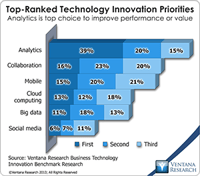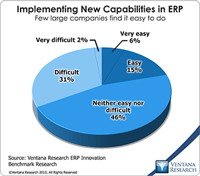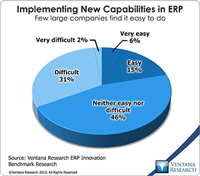Workday Financial Management (which belongs in the broader ERP software category) appears to be gaining traction in the market, having matured sufficiently to be attractive to a large audience of buyers. It was built from the ground up as a cloud application. While that gives it the advantage of a fresh approach to structuring its data and process models for the cloud, the product has had to catch up to its rivals in functionality. The company’s ERP offering has matured considerably over the...
Read More
Topics:
Microsoft,
SAP,
ERP,
FP&A,
Human Capital,
NetSuite,
Office of Finance,
Reporting,
close,
Controller,
dashboard,
Tax,
Operational Performance,
Analytics,
Business Intelligence,
Business Performance,
Cloud Computing,
Collaboration,
Financial Performance,
IBM,
Oracle,
Uncategorized,
CFO,
Data,
Financial Performance Management,
FPM,
Intacct,
Spreadsheets
The enterprise resource planning (ERP) system is a pillar of nearly every company’s record-keeping and management of business processes. It is essential to the smooth functioning of the accounting and finance functions. In manufacturing and distribution, ERP also can help plan and manage inventory and logistics. Some companies use it to handle human resources functions such as tracking employees, payroll and related costs. Yet despite their ubiquity, ERP systems have evolved little since their...
Read More
Topics:
Big Data,
Microsoft,
SAP,
Social Media,
Supply Chain Performance,
ERP,
FP&A,
Human Capital,
Mobile Technology,
NetSuite,
Office of Finance,
Reporting,
close,
closing,
Controller,
dashboard,
Reconciliation,
Operational Performance,
Analytics,
Business Collaboration,
Business Intelligence,
Business Performance,
Cloud Computing,
Collaboration,
Financial Performance,
IBM,
Oracle,
Uncategorized,
CFO,
Data,
finance,
Financial Performance Management,
FPM,
Intacct
Whatever Oracle’s cloud strategy had been the past, this year’s OpenWorld conference and trade show made it clear that the company is now all in. In his keynote address, co-CEO Mark Hurd presented predictions for the world of information technology in 2025, when the cloud will be central to companies’ IT environments. While his forecast that two (unnamed) companies will account for 80 percent of the cloud software market 10 years from now is highly improbable, it’s likely that there will be...
Read More
Topics:
Microsoft,
Predictive Analytics,
Sales Performance,
SAP,
Supply Chain Performance,
ERP,
Human Capital,
Mobile Technology,
NetSuite,
Office of Finance,
Reporting,
close,
closing,
Controller,
dashboard,
Tax,
Customer Performance,
Operational Performance,
Analytics,
Business Collaboration,
Business Intelligence,
Cloud Computing,
Collaboration,
IBM,
Oracle,
Business Performance Management (BPM),
CFO,
Data,
finance,
Financial Performance Management (FPM),
Financial Performance Management,
FPM,
Intacct
Read More
Topics:
SaaS,
Customer Experience,
NetSuite,
Office of Finance,
Recurring Revenue,
Zuora,
Customer Performance,
Operational Performance,
Business Performance,
Cloud Computing,
Customer Service,
Financial Performance,
billing software,
Intacct
Recurring revenue is a term applied to business models that involve three types of selling and billing structures: a one-time transaction plus a periodic service charge; subscription-based services involving periodic charges; or a contractual relationship that charges periodically for goods and services. Telecommunications was the first major industry to use it, but recently the model has gained popularity in others. It is a major trend in information technology as an increasing number of...
Read More
Topics:
SaaS,
Customer Experience,
NetSuite,
Office of Finance,
Recurring Revenue,
Zuora,
Customer Performance,
Business Performance,
Cloud Computing,
Customer Service,
Financial Performance,
billing software,
Intacct
Financial management software provider Intacct recently held its seventh annual user conference. In addition to a long list of enhancements in current and upcoming product releases, the company used the occasion to announce Intacct Collaborate, a capability built into its software that enables finance and accounting organizations to work together to answer questions or resolve issues while performing a process. Our benchmark research shows that collaboration ranks second in importance behind...
Read More
Topics:
Performance Management,
Sales Performance,
Salesforce.com,
ERP,
Human Capital Management,
NetSuite,
Office of Finance,
Reporting,
cloud ERP,
Analytics,
Business Analytics,
Business Collaboration,
Business Performance,
Chatter,
Cloud Computing,
Collaboration,
Dashboards,
Financial Performance,
FinancialForce,
Intacct
In the wake of the past year’s usual crop of failed ERP implementations, I’ve read a couple of blogs that bemoan the fact that ERP systems are not nearly as user-friendly or intuitive as the mobile apps that everyone loves. I’ve complained about this aspect of ERP, and our research confirms that ERP systems are viewed as cumbersome: Just one in five companies (21%) said it is easy to make changes to ERP systems while one-third (33%) said making changes is difficult or very difficult. Yet as...
Read More
Topics:
Mobile,
SAP,
ERP,
Analytics,
Business Collaboration,
Business Performance,
Cloud Computing,
Financial Performance,
Oracle,
CFO,
Infor,
Workday,
Social,
business process,
FPM,
Intacct
Enterprise resource planning (ERP) systems emerged in the 1990s. Even though they don’t do much in the way of planning, the systems provide companies a means of centralizing and consolidating transaction data collection (such as purchase orders, inventory movements and depreciation), automating the management of processes, and handling the bookkeeping and financial record keeping for these transactions and related processes. ERP systems are an indispensable piece of IT infrastructure in today’s...
Read More
Topics:
Mobile,
SAP,
Social Media,
Supply Chain Performance,
ERP,
Operational Performance,
Analytics,
Business Collaboration,
Business Performance,
Cloud Computing,
Financial Performance,
Oracle,
CFO,
Infor,
Workday,
Social,
FPM,
Intacct
As Workday continues to expand and the likelihood of its IPO becomes a more frequent topic of discussion, so does the movement of ERP systems to the cloud. Thus far, only a minority of companies have chosen to put their ERP and accounting systems in the cloud, but the numbers are growing and there’s evidence of success. NetSuite, for example, reported a 26 percent increase in its revenues to $145 million in the nine months up to Sept. 30, 2011. To be sure, this is not close to Salesforce.com’s...
Read More
Topics:
Microsoft,
Sales,
Supply Chain Performance,
ERP,
NetSuite,
Office of Finance,
Dynamics,
Epicor,
Lawson,
QAD,
Operational Performance,
Business Performance,
Cloud Computing,
Financial Performance,
IBM,
Oracle,
Workforce Performance,
Infor,
financial software,
Intacct,
PeopleSoft,
Software
